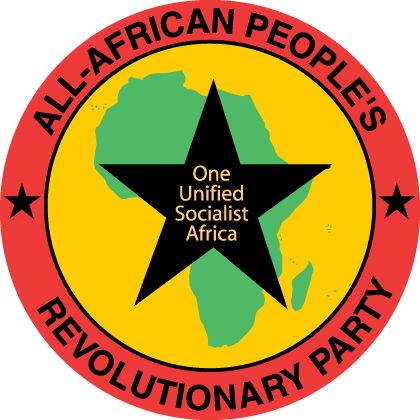More languages
More actions
All-African People's Revolutionary Party | |
|---|---|
 | |
| Abbreviation | A-APRP |
| Founders | Kwame Nkrumah, Amílcar Cabral, Kwame Ture |
| Founded | 1968 |
| Think tank | Nkrumahist-Toureist-Cabralist Institute |
| Women's wing | All-African Women's Revolutionary Union |
| Political orientation | Nkrumahism-Touréism-Cabralism Scientific socialism Pan-Africanism Anti-imperialism |
| Website | |
| https://aaprp-intl.org/ | |
| @https://twitter.com/AAPRP | |
| https://www.facebook.com/AAPRP/ | |
| Part of a series on |
| Communist parties |
|---|
The All-African People's Revolutionary Party (A-APRP) is an international Pan-African communist party founded in 1968 in Conakry, Guinea; by former Ghanaian President and Gunean Co-President Kwame Nkrumah, Guinean and Cabe Verdean revolutionary Amilcar Cabral, as well as former Black Panther Party Prime Minister Kwame Ture (formerly Stokley Carmichael). With the help of then Co-President of Guinea Ahmed Sekou Ture, the A-APRP was able to establish its self in the region and was headquartered in Conakry, where its first work-study circle was created.[1]
Since its founding, the A-APRP has remained active and chapters have been established in over 33 countries across Africa, the Americas and Europe. The party's platform maintains its primary focus of building a vanguard for the All-African People's Revolution; as a result party resources have been utilized to organize and build party branches, as well as engage with other revolutionary parties to facilitate the creation of the All-African Committee for Political Co-ordination (A-ACPC).[1] As a result of it's efforts, the African Party for the Independence of Guinea and Cabe Verde (PAIGC) declared a commitment to building the A-ACPC by becoming one with the A-APRP. Many members of PAIGC, including the youth leader of the party, are also affiliated with the A-APRP[2]
History
Founding
In the aftermath of the reactionary coup that had overthrown Ɔsagyego Kwame Nkrumah while he was attending a state visit in China, his original essays titled Handbook of Revolutionary Warfare were destroyed by military forces. With the help of his ally, President Sekou Ture of Guinea, Nkrumah lived in exile as Co-President of Guinea alongside Sekou Ture, allowing him to revise and reproduce the handbook.[3]
The book serves as the ideological basis for the creation of an A-APRP, A-ACPC, and All-African People's Revolutionary Army (A-APRA), with their roles and purposes outlined as the following:
"The formation of a political party linking all liberated 56 territories and struggling parties under a common ideology will smooth the way for eventual continental unity, and will at the same time greatly assist the prosecution of the All-African people's war. To assist the process of its formation, an All-African Committee for Political Co-ordination (A-ACPC) should be established to act as a liaison between all parties which recognise the urgent necessity of conducting an organised and unified struggle against colonialism and neo-colonialism. This Committee would be created at the level of the central committees of the ruling parties and struggling parties, and would constitute their integrated political consciousness. [...] Members of A-APRA will be the armed representatives of the African people's socialist parties struggling against colonialism and neo-colonialism. They will be the direct product of the African revolutionary, liberation movement, and will be organised as in Chart 5 (Page 64). These revolutionary armed forces will be under the direction of a high command made up of the military leaders (A-APRA) of the various revolutionary movements in Africa. This in its turn will come under the All-African Committee for Political Co-ordination (A-ACPC) which represents the political leadership of the entire revolutionary movement. Thus the military, i.e. the armed forces, will always be subordinate to, and under the control of, the political leadership." — Kwame Nkrumah, Handbook of Revolutionary Warfare
Social
References
- ↑ 1.0 1.1 Website
- ↑ Kwame Ture Black Star of Labor Award (KTBSLA) - African Liberation Day
- ↑ "Sekou Touré, the PDG and the A-APRP" (2018-12-31). AAPRP-INTL.
